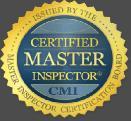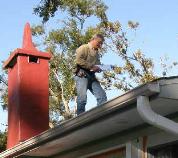







Combination
Code Certified
5188826 R-5
National
Certified Master Inspector®



Grandfathering
Grandfathering" is a term used that tries to encourage an exception to a negative existing condition and convince another to accept it and continue the noncompliance.
Grandfathering can potentially cause personal injury or death, or exacerbate damage to property. The issue with grandfathering is that it is not allowed under the (Texas) statewide inspection standards of practice or in any repair work under Texas SB 365 which adopted the International Residential Code (IRC). If it's wrong, it's wrong.
The Texas minimum inspection standards were designed "to more accurately reflect current technology, codes, and practices that form the basis of many of the standards" according to the Texas Real Estate Commission.
"Nowhere in the inspection standards for the inspection process or in the rules of the Texas Real Estate Commission is grandfathering allowed that would exempt a disclosure of a deficient part or component, an item in need of repair, a safety hazard or minimum standard violation. No where is grandfathering allowed under the statewide inspection standards or codification. The problem is where your home inspector is not ICC code certified so he/she wouldn't know what a minimum standard, a safety hazard or violation is." All ICC code certified inspectors have an ID card. "ICC saves lives. It saves yours everyday".
"One may hear that some item was not code when the home was built" like it was only yesterday. You should require the author of that statement to prove it instead of offering a non-substantiated preference or soft sell to make his/her real client happy. They are a liar. In a majority of time it was required. It's that the author is helping to facilitate the sale and not represent the buyer.
The International Code Council in its "Legal Aspects of Code Administration" admonishes the public by saying , "it is up to the purchaser to determine the soundness of the building prior to the finalization of the purchase and/or to hire a professional inspector". (i.e. A professional inspector versed and certified in the codes.) If not then you are simply getting smoke and mirrors wooed by a cheap fee promoted by those who stand to gain a financial reward for a soft inspection devoid of substance.
It is amazing how fast backseat code experts come out of the woodwork with these claims when money is involved and, they don't even own a code book or are code certified. Can they provide anything in writing where it is was not required or "grandfathered"? No. Excuses come as fast and funny as the claim of "the city passed it" (by a third or fourth owner 16 years later). Cities do not do code inspections as you know it and they certainly do not follow the statewide TREC inspection standards of practice which is required to be followed without grandfathering.
The Texas minimum inspection standards are extensive and can be much tougher than other states and any inspector association (ASHI, NACHI, etc.). Some agents will bash inspectors for following the minimum standards so the inspection industry is basically punished for doing what is considered the minimum inspection.
Remember, all the bad stuff in used homes were there or caused many times from the time of construction. Yes, new homes need to be inspected and they should be inspected by full ICC code certified inspectors. Builders or remodelers in Texas are not licensed or regulated. New homes are increasingly being buit by accountants and not experienced superintendents.
According to a homeownersoftexas.org article, "defective homes are now a national problem. Builders are selling defective homes with little regard for building codes. Builders can get around building codes and obtain certificates of occupancy on defective homes by simply filing an affidavit that the home meets the building code after an inspection by inspectors the builder hires. It is now harder for local inspectors to inspect all homes being built. The result is a flood of defective homes, with little recourse for the buyers."
